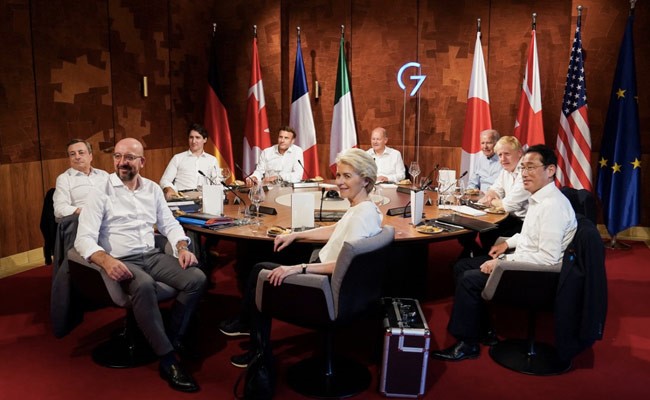| Translate This News In |
|---|
As G7 leaders convened for a conference dominated by the Ukraine crisis and its impact on food and energy supplies, as well as the global economy, US President Joe Biden urged allies that “we must stand united” against Russia.
Four of the Group of Seven affluent nations decided to ban Russian gold imports at the opening of the conference in the Bavarian Alps, tightening the sanctions grip on Moscow and cutting off its methods of financing the invasion of Ukraine.
It was unclear whether the initiative had G7 support, with European Council President Charles Michel saying the subject would need to be handled cautiously and explored further.
The United Kingdom, the United States, Japan, and Canada agreed on a moratorium on new Russian gold imports, the British government announced on Sunday.
Britain said the restriction was aimed at affluent Russians who had been buying safe-haven bullion to offset the financial impact of Western sanctions. Last year, Russia’s gold exports totaled $15.5 billion.
According to a German government source, the G7 leaders of Britain, France, the United States, Germany, Japan, Italy, and Canada were also holding “very good” talks about a possible price restriction on Russian oil.
According to a French presidency official, Paris would press for an oil and gas price ceiling and is ready to debating a US proposal.
The G7 leaders did agree on a vow to generate $600 billion in private and public financing for developing nations in order to counter China’s expanding influence and mitigate the impact of rising food and energy prices.
German Chancellor Olaf Scholz welcomed Senegal, Argentina, Indonesia, India, and South Africa to the summit as partners. Many countries in the global south are worried about the consequences of Western sanctions against Russia.
Food price increases have caused “visceral suffering” in developing countries, according to Oxfam and other advocacy groups.
They want G7 leaders to tax excessive corporate profits in order to assist those affected by the food crisis, eliminate debts owed by the poorest nations, and support developing countries in their fight against the food crisis and climate change.
According to an EU official, the G7 will make it clear to partner countries that food price increases are the product of Russian activities, not Western sanctions.
According to individuals familiar with the situation, officials from some G7 countries, including Germany and the United Kingdom, are lobbying for temporary waivers on biofuel regulations in order to tackle rising food prices.
According to Reuters, Germany anticipates the initiative to fail to gain G7 support due to opposition from the United States and Canada.
Unity is being tested.
When Russia invaded Ukraine in February, Western countries rallied alongside Kyiv, but more than four months later, that solidarity is being tested as skyrocketing inflation and energy shortages affect their own citizens.
Biden hailed Scholz for displaying leadership on Ukraine at the opening of a bilateral discussion, saying Russian President Vladimir Putin had failed to shatter their solidarity.
“Putin has been betting since the outset that NATO and the G7 will split. But we haven’t and won’t, “Biden explained.
Scholz can use the meeting to show more forceful leadership in the Ukraine conflict.
After Russia’s incursion in February, he promised a transformation in German foreign and defence policy, but critics have accused him of dragging his feet.
As missiles targeted the Ukrainian capital Kyiv on Sunday, striking an apartment building and a kindergarten, Foreign Minister Dmytro Kuleba said the G7 must reply with more weaponry and stiffer sanctions against Russia.
Biden referred to the strikes as “barbarism.”
The G7 leaders are also scheduled to debate measures for dealing with rising energy prices and replacing Russian oil and gas imports, as well as additional sanctions that do not exacerbate the cost-of-living problem impacting their own populations.
Soaring global oil and food costs are weighing on economic development in the aftermath of the Ukraine conflict, with the United Nations warning of a “historic global famine crisis.”
Climate change is also on the G7 agenda.


















